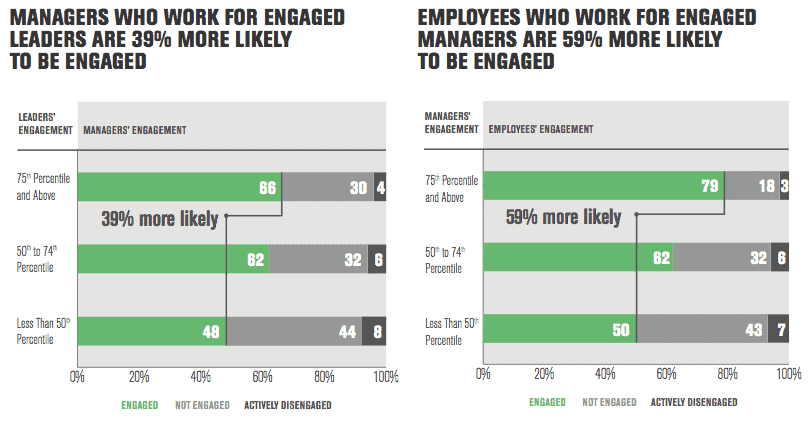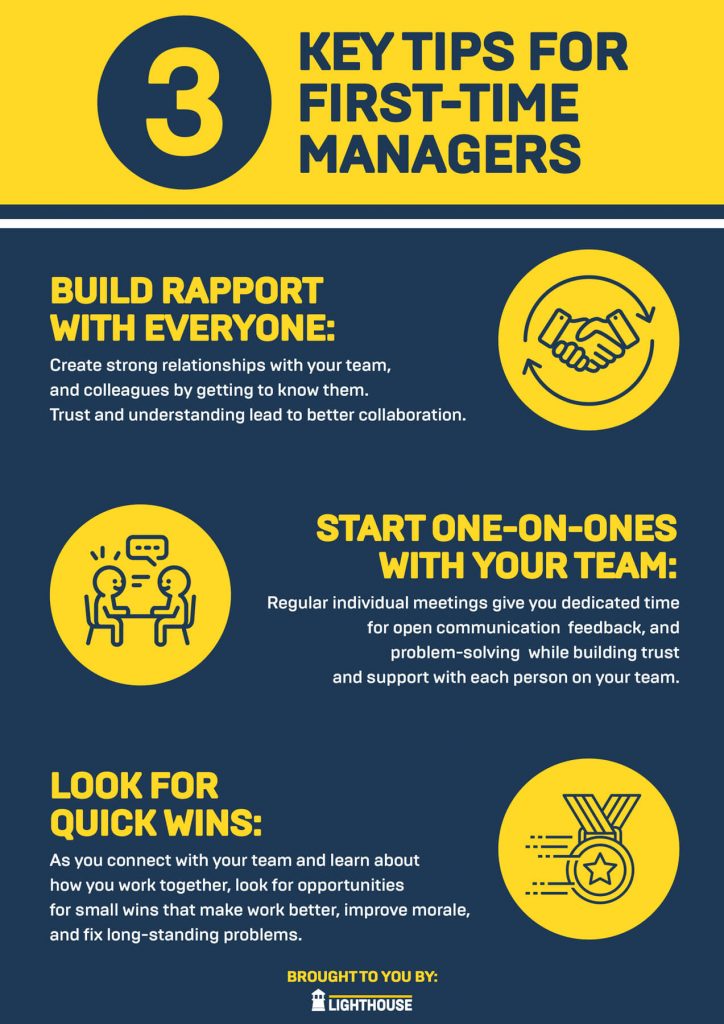(Already got the role? Looking for tips for getting started as a first-time manager? Jump to Part 2 of this guide.)
Ever thought about becoming a manager? Want to know what it takes and how to move up from your individual contributor role?
Becoming a manager opens a whole new world of opportunity. With the right mindset and skills, you'll find it is interesting, challenging, and rewarding.
It also comes with new responsibility and usually higher pay (which is always nice!).
Whether you just started thinking about becoming a manager, or have known you've wanted to be one for a while, we're here to help you.
Problem: How do you get hired to do something you've never done before?
Unfortunately, becoming a manager is not the easiest career step. Especially for roles like management, most companies only want to hire people who already have experience.
What then are you supposed to do?!?
At Lighthouse, we've covered a wide variety of management topics, including the qualities of a good leader and how to help new managers succeed.
With that research and experience, we know what most managers are looking for when they work to identify new leaders to promote.

Solution: Show you'd be a great manager
You might not have management experience yet, but you can position yourself so that you're seen as an ideal candidate for the next management position that opens up.
And, if you do that, you'll also be setting yourself up to be a great manager in the process.
Below is a breakdown of what we'll be covering today, so you can explore the sections most meaningful to you.
Table of contents:
- Part 1: How to become a manager: Tips for getting noticed and developing yourself into a successful, future manager
- Part 2: How to be a manager: Success tips for first-time managers
- More tips and guides on how to be a manager
First, let's talk about how to become a manager, including tips for getting noticed and how to develop yourself into a good leader.

How to Become a Manager: Tips for getting noticed and developing yourself into a successful, future manager
The good news: There are qualities of a team leader that any good manager or CEO knows to look for in a potential manager.
This means you can work to develop and display these qualities to get noticed and be ready to lead well when given the opportunity, whether at your current company, or your next one.
And in the next section (Part 2), we'll talk about tips for getting off on the right foot as a new manager.
But first, here are 5 tips to help you get noticed and start developing yourself into a future manager:

1) Make sure you're becoming a manager for the right reasons (it matters, read on)
Becoming a manager requires the willingness to learn new things – a lot of new things – and be challenged. It's a career change as much as it is a promotion, so make sure that becoming a manager is what you really want.
There are a lot of reasons you might want to be a manager, but only some of them are good reasons. If you're not careful, you can end up in a job you don't like. Consider carefully these reasons, so you make the right decision.
1. You're doing it for the challenge of helping others and learning new skills, NOT the money
Managers who take the position for the money tend to run into a variety of problems and eventually fail.
First, they often keep doing their old job, instead of embracing the responsibilities and tasks of being a manager.
Then, as they struggle, they bring a bad attitude to their team that over time makes everyone else unhappy, too. As things get worse, they then hide from problems that could eventually result in them losing their position (and the money they thought they wanted).
There's nothing wrong with liking the pay boost. However, your main reason for wanting to become a manager needs to be something deeper.
Good reasons to become a manager include the desire for growth, challenge, or the fulfillment you get from building up and helping others.
2. You like working with & helping people
Being a manager is all about working with others and supporting them. If you love working with others, you're a natural fit for management. If not, it's probably not right for you as you'll run away from the moments you're needed most and your team is trying to reach you.
When people take management roles without the desire to help, collaborate, and help fix problems within a team, they're setting themselves up to fail. A manager that runs from these things can make people feel betrayed; they don't know who to turn to for help, and then problems fester and create management debt.
Other people's problems become things you have to think about if you want to be a manager. You won't get to solve them all, but you will have to want to understand them so you can help where you should.
3. You're willing to give up being an individual contributor
To be a good manager, you need to shift from being an individual contributor to someone who focuses on how they can improve their team. At the core, you become a multiplier (more on this later).
This is a critical mindset shift, as it's the difference between an extra hour of productivity here and there for you vs. dozens of hours for your team.
Each time you focus on making your team more effective can lead to exponential results because you're dealing with an entire team of people, instead of your own individual output only.

4. You have a growth mindset
A growth mindset is critical to becoming a manager. You have to believe that you (and others) can learn new skills, even if you're starting from scratch. No one is a natural; everyone can achieve some level of ability with hard work.
There's a lot to learn when shifting from IC work to being someone whose entire focus is making a team work more effectively.
If you don't have a growth mindset, it's going to be impossible to learn everything you need to know to do your job well. While great managers roll up their sleeves and learn, you'll be thinking, "I'm just not good at ____." This will hold you and your team back from the success they could have.
Most importantly, as a leader, you also influence the rest of your team. If you're not willing to learn and grow, your team will take the cue and be less likely to embrace learning as well. You will also then limit their careers, as you will only give them work they're experienced in, instead of coaching them to take on new challenges.
5. You love your job
Engagement plays a huge role in workplace productivity and employee retention. If you don't enjoy your job, you'll have a hard time performing at a high level.
If you don't like your job or the company you work at, you should not become a manager there. It will only make things worse for you and your team.
Unfortunately, this is a common problem, which is called the "cascade effect” by Gallup:

Put simply, if your boss doesn't like their job, or is disengaged, then there's a good chance you will feel the same.
Rarely does a bad situation get better just because you got promoted, so beware of becoming a manager at a company or role you don't like. Not only will it likely end badly for you, but it will also hurt your team.
Coming full circle, you can see that with all the reasons you should or should not become a manager, your decisions affect more than you. Be mindful of that and choose wisely when, or if, you become a manager.
Not sure if management is for you? Here are some of the most common reasons people become bad managers.
2) Show you have the ability to teach others
A big part of management is the ability to coach and teach others. There are a million teachable moments and important times to grow your people as a manager.
Being someone who is comfortable coaching can be a big plus when making your case for a new management opportunity. But how can you do that when you're not already a manager?
The answer: Become a mentor.
Mentor a teammate
Mentoring sits in the relationship management quadrant of emotional intelligence skills, a critical set of skills every manager needs to develop:

Mentoring is highly effective, as researchers Rose Opengart and Laura Bierema from the University of Georgia discovered. They found that employees who get regular mentoring attain higher positions, better pay, and report more career satisfaction.
If you can show you have the ability to mentor and teach another teammate, you're displaying an important leadership skill that every great manager possesses. It's also a great way to get noticed for another reason: you're showing tangible proof of your ability to lead and manage others.
Not sure where to start? Consider asking if you can help mentor an intern first.
Most interns could use more support than they get, and companies would like to say they give lots of mentorship to them.
Best of all, it's low-risk for all of you. An intern will be gone at the end of the summer, so any mistakes will soon be forgotten, and you'll have a natural end to the process in case you don't like it.
If they come back with positive reviews, you can then push for more opportunities, likely with full-time teammates.
Develop your writing skills
Communication skills are vital to being a good manager. You'll be regularly communicating with your team, to other teams, and managing up your company's org chart regularly.
While this communication will take many forms (meetings, presentations, emails, calls, etc), writing will be a big part of many of them. Further, with the rise of remote work, writing has never been more important, as written word replaces many face-to-face moments in an office.

Online communication can make it difficult to discern intent, as former Chairman and CEO of Pepsi Indra Nooyi has pointed out. That's because we're lacking critical cues from things such as body language, or when text only, facial reactions and tone of voice as well.
As a result, our natural tribal instincts can nudge us toward defensiveness and assume the negative intent of others. Unfortunately, that results in conflict and misunderstandings.
This means that the ability to communicate effectively, in a way that avoids this kind of conflict, is more valuable than ever.
You can develop your writing skills in a variety of ways:
- Write a blog post to teach others something you know.
- Create Google Docs, Word Docs, or wiki entries on a topic to help your teammates or colleagues.
- Step up and take notes in a meeting, or own updating other teams on your team's progress.
Not only does this give you more visibility to others that you take initiative and have important things to say, but it also:
- Helps you clarify what you know and get better at organizing ideas.
- Improves your ability to clearly communicate your thoughts in written form, improving your communication skills.
The first step to becoming a manager is often taking initiative. Stepping up to help others, improving communication in your team or across others, and writing well are all signs to those who decide who could become a manager next that you could be a good leader.
It can be difficult to navigate the nuances of being a strong, respected manager rather than showing early warning signs of ineffective leadership. For actionable advice on avoiding common downfalls, see our in-depth analysis of Good Leadership and Bad Leadership Examples.

3) Make others around you better
One of the most fundamental changes every good manager needs to adopt is switching from an individual contributor (IC) mindset to a multiplier mindset.
Before you become a manager, you focus on maximizing your productivity and efficiency. It's all about shipping that code, completing that copy, closing those tickets, or hitting that sales goal.
However, once you become a manager, it's far more effective to ask, "How can I make my team more productive and efficient as a whole?”
That is what it means to adopt a multiplier mindset.
As an individual contributor, you are only responsible for yourself. Meanwhile, as a manager, you can take steps to make your entire team more productive and literally multiply your team's efforts.
Focusing on yourself is productivity, while the other is productivity on steroids as Camille Fournier, author of The Manager's Path, and former CTO of Rent the Runway explained in her Velocity NY keynote:
Think of creative ways to make your team better
Adopting a multiplier mindset is at the core of what it means to become a great manager. When you make others around you better, more effective, or unblocked, you maximize their potential.
By showing that you have the ability to make those around you better, you'll start to be seen as a potential future manager.
How do I become a multiplier?
Chances are, you know your teammates well. At least, well enough to know what some of their challenges are and some of the problems the team is facing as a whole.
Use that knowledge to think of creative ways to make your team better. If something or someone is serving as a bottleneck, or some work is inefficient or ineffective, here's how you can help:
- Talk with those affected: Shopping ideas, getting buy-in (especially a first follower), and collaborating on solutions are key to bringing effective change.
- Volunteer to help: Bosses order people around. Leaders show the way. You can always step up and be a part of a solution, but be careful volunteering other people without their agreement.
- Collaborate with your manager: Your manager may or may not be aware of a problem. Coming to them shows you understand how to manage up, and if you also bring a solution, they then can trust you can resolve problems, too.
By being proactive, and inclusive in how you find problems and help to resolve them, you'll show your peers and your manager that you can effectively lead. You'll also be demonstrating you're a multiplier as you unleash your coworkers to do more of their best work.
Other tips for getting noticed by making your team better
You might not be a manager yet, but you can start thinking about ways you can get noticed as a multiplier within your team. Here are some more examples to get you thinking:
- Use one on ones with your manager to share insights related to multiplying your team's productivity or efficiency. Your manager hears a small fraction of what's actually happening on your team. If there's a helpful way to let them know about a problem, opportunity, or idea to make things better – not gossip or politics – put it on your 1 on 1 agenda.
- Does something unsexy need done? Step up. A lot of the work of managers is unglamorous. If no one else does something, it often falls on the manager. If you can take ownership of some of those things, you can make a strong impression.
- Bring solutions, not just problems. We mentioned it and it bears repeating: you make the best impression with your manager if when you present a problem, you also have at least a foundation for the solution or a few ideas. Otherwise, it feels like you're just putting more on their busy plate.
Learning to think like a multiplier is often a big mindset shift. However, the more you can start thinking that way, and effectively helping make those around you better, the more you'll be ready to be a great manager.

4) Learn from the best managers (and become a lifelong learner)
There's a lot that goes into being a manager. Most who take the job go into it completely unaware of just how different it is from their current role.
As Lindsay Holmwood, Engineering Manager at Envato remarked on his blog, management is a career change:
"If you want to do your leadership job effectively, you will be exercising a vastly different set of skills on a daily basis to what you are exercising as an engineer. Skills you likely haven't developed and are unaware of.”
You'll need to become a lifelong learner if you want to be a great manager. The good news is, this is yet another way to get noticed while simultaneously developing yourself.
Becoming a life-long learner
According to Standford psychologist Carol Dweck, a growth mindset makes a critical difference in virtually every way when it comes to learning and development. And it's especially important for managers.
Those with a fixed mindset believe intelligence is fixed, which affects their ability to handle challenges, criticism, and work with others. Meanwhile, those with a growth mindset embrace challenges, learn from criticism, and learn from others who succeed.

As we talked about earlier, a growth mindset is necessary for new managers because there's a lot you need to learn. It's also this growth mindset which is a key factor that great leaders know to look for in potential managers; they know that the only way a new manager succeeds is if they're ready, willing, and able to rapidly learn and build new skills.
With this in mind, if you display this mindset through a willingness to learn and grow, you'll help yourself get noticed while improving at the same time.

Study those you admire
The best examples to learn from are those managers you already know and admire. If you had, or have, a manager you love then look to them.
What do they do that you really appreciate? Try to pinpoint what makes them different from a bad manager you might have had in the past. Both can teach you what to do (or not do).
Also, look to those founders, CEOs, and managers from other companies whom you follow and admire.
Start seeing their advice from the perspective of someone who leads people as a profession. Ask yourself how you can live out the values, concepts, and lessons they speak, write, or talk about. The more you act like a leader, the more you'll be treated like one.
Look to books for the greatest management lessons
If you want to learn how to become a manager, why not look to those who have come before you?
Books are a great place to learn about being a manager. Many of the greatest modern leaders have put out books with all their best lessons summarized in a few hundred pages.
Whether you're an aspiring manager or you're preparing for a new promotion into management, this is one of the best places to look if you want to learn how to become a better manager quickly.
Here are several books we recommend for all future, would-be, or current managers alike:
High Output Management by Andy Grove
Grove's "High Output Management" is a timeless read, still relevant nearly 40 years after it was written. It’s the first book we recommend to any manager, because it covers so many of the fundamentals of good management. In this book, you’ll learn how to handle a variety of the biggest challenges leaders face, while learning how to keep your projects on track even when you’re busy.
Andy Grove’s lessons have inspired many of our posts on the Lighthouse blog, including these:
- 10 Key Andy Grove Quotes on Leadership from High Output Management
- How to have great one on ones like Andy Grove in High Output Management
- The Most Important Management Concept You're Missing: Task Relevant Maturity
How to Win Friends and Influence People by Dale Carnegie
Even older than "High Output Management", this nearly 90 year old classic, “How to Win Friends and Influence People” remains one of the best books ever written on leadership. A huge part of being an effective leader is understanding people and effectively working with and motivating them. This book is a master class on the soft skills side of leadership with clear actions at the end of every chapter along with memorable, actionable stories you’ll love.
If you want more lessons on building your soft skills, and learning from Dale Carnegie, check out these posts:
- How to Build Rapport with Anyone.
- How to improve emotional intelligence for a leader.
- How Managers can be more Effective Listeners.
Creativity, Inc. by Ed Catmull
If you have ever marveled at the craftsmanship and amazing storytelling of most Pixar films, this is the book for you. In this part-autobiography, part leadership book, Pixar’s co-founder, Ed Catmull takes you through a journey of growth and hard earned lessons he learned. He shares the processes that help make Pixar movies so amazing, and the great lengths he went to protect and improve the culture along the way.
Further reading from the blog:
- 10 Key Ed Catmull Quotes on Leadership from Creativity, Inc.
- How To Change The Culture Of Your Team To Prevent Major Problems.
- How to Give Constructive Feedback.
More books that teach you to be a great manager
If you're looking for more books from great leaders to read, you may like some of the other books and authors we've profiled on the Lighthouse blog including:
- Hall of Fame NFL coach Bill Walsh with The Score Takes Care of Itself (our recap here)
- 12 time NCAA Champion John Wooden with his Life Lessons On and Off the Court (our recap here)
- Current day CTO Camille Fournier with The Manager's Path (our recap here)
- And for great audio content designed to help you become a better manager, listen to Lighthouse's Create High Performing Teams Podcast episode, The Most Important Skills for Managers to Master:

5) Join a company that's growing
Think of the effort you're putting into becoming a manager and leader as an investment in yourself. You don't want to make a bad investment.
Just as there are several different ways to invest in real estate, stocks, etc., you get to choose, to some degree, what company you invest your time and life in.
Companies that promote from within give you many opportunities to move up. This is much better than waiting for your boss to leave or get fired.
Unfortunately, if you are working at a company that isn't growing, your opportunities are reduced quite a bit. If you're in that kind of situation, you may want to look for another company to join, who will then later give you the opportunity to become a manager.

Choose a company that promotes from within
If your company isn't promoting from within, that could be just as bad as one that isn't growing at all for your hopes of becoming a manager. The former may overlook your potential and interest in managing in favor of hiring in other, experienced leaders.
Ideally, you want to work at a company that has a track record of rewarding leadership potential with management roles. You'll notice this by looking at the Linkedin profiles of people at the company to see who has been there a few years, and if they've been promoted.
If you're interviewing, then ask how they support new managers. Do they provide new or soon-to-be managers with resources to learn about and move more easily into their new position? Do they provide management training of any kind? And do they invest in developing leadership skills across the organization?
It's often difficult to learn everything in an interview process. However, if you have your choice of options, choose the one that seems to be the best mix of growth potential, the habit of promoting from within, and supporting leaders once they're promoted.

Part 2: Success tips for first-time managers (Or: You got the job! Now what?)
First of all – congratulations!
If you're now a new manager, you've got a lot to look forward to. With that said, you might be a bit overwhelmed with everything and not sure how to get started on the right foot.
As we said earlier (and it begs repeating, especially now), becoming a manager is a career change.
Now that you are one, begin to see your journey as a leader and manager as a lifelong learning process.
Chances are, you've got a lot to learn. That's part of the fun of it, though. Like a puzzle you put together over time, each skill you pick up and lesson you learn will help you build yourself into a great leader.
Remember: You're in the multiplication game now. Everything you learn can have a compound effect, because you'll be helping each of your team members perform better as opposed to just you as an IC.
To help you start off on the right foot, here are some essential tips for starting off as a new manager.
For the full set of tips, check out our guide here on how to succeed as a first-time manager.

1. Build rapport with everyone (not just your team)
Good rapport is the key to maintaining good relationships with everyone you work with, from your team to your boss to peers.
As a manager, you want to quickly build rapport with each of your team members to start building a good relationship, which will promote healthy communication and help you better understand your team members as individuals. We recommend these questions to ask employees as a new manager.
That's vital, but so is developing a relationship with everyone else you work with.
Building rapport with your bosses and peers helps you stay better connected to what's going on in the company at large, and helps you navigate struggles and issues.
Think about it: if a stranger bumps into you, will you give them the benefit of the doubt? Maybe not. Meanwhile, if a friend or colleague you know did, you probably would assume they didn't mean to. That's just one kind of trust that comes from having rapport with others.
With all the new things you'll be learning about, the potential for mistakes, and inherent challenges that come with working cross-functionally, it's incredibly valuable to have rapport with those you work with.
Further reading: Not sure how to build rapport? Grab a few starter ideas from 102 Ways to Build Rapport or use the whole list as a reference.

2. Start one on ones with your team
As a manager, one on one meetings are your secret weapon.
They allow you to effectively build rapport (making them great for facilitating #1 above), create a consistent feedback loop, and dig up issues affecting your team, among other things.
The only problem is it can take time to develop a strong foundation of regular one on ones with your team. That's all the more reason to make sure you get started right away.
The sooner you start having regular one on ones with your team, the sooner they'll see the value and want to keep coming back. Good one on ones are like a flywheel that keeps building momentum as you dig into topics important to your team, and over time help them fix and otherwise make progress on them.
Further reading:
First, start by learning more about how to start one on ones with your team.
Then, before starting your first one on one, make sure to grab two things:
- Our one on one meeting template, which is a one on one master guide to help make your one on ones more effective.
- And download this 1-sheet for useful reminders and guidelines to help guide your meetings: 30 Dos and don'ts for effective one on one meetings

3. Look for quick wins (Generate momentum)
Remember when we talked earlier about creative ways to make your team better and get noticed?
For example, if you notice something bothering a team member, or a task that's unsexy but holding everyone back, taking care of either of those can send a powerful message to your team.
It's important to grab some quick wins in your first few days or weeks as a manager as it creates a sense of momentum.
Why is momentum so important? Not only does it create a feeling of progress, which makes your employees happier (see: Progress Principle), but it prevents burnout as it keeps them engaged and excited about the work they're doing.
Even big projects like a long term promotion, or a major initiative can have mini-milestones along the way. Find them and look to celebrate them and you'll keep your team focused and engaged for the long haul.
To learn how to become a manager, start acting like one
You don't have to be a manager now to start thinking and acting more like one.
Great managers don't strut around like Lumbergh from Office Space, passive-aggressively bossing their team around while pushing for status updates every five minutes.

Instead, they're thoughtful, aware, and think at scale. They seek to listen to each team member and work with them to overcome issues.
Great managers want to know your goals and help you achieve them. They're also always thinking about how they can help their team, whether that means removing blockers, improving a process, or helping overcome conflict.
You can learn to do many of these things even without the title.
Be mindful of what is outside of your scope of responsibility, and don't step on any toes. However, if you come from a mindset of caring about others and wanting to make things better, you'll find most people are happy to have you make things better.
If you start working on some of the areas we've covered today, you'll be far more likely to get noticed as someone with leadership potential and a future manager when the opportunity presents itself. You can do that by:
- Having an interest in being a manager for the right reasons
- Showing that you have the ability to teach others
- Making those around you better
- Learning from the best managers, and living their lessons
- Investing your time in a company that's growing and is intentional about promoting from within.
Being a manager is as challenging as it is rewarding. By following these tips, you'll be more likely to get noticed and be well-prepared for the role when you do get to become a manager.








